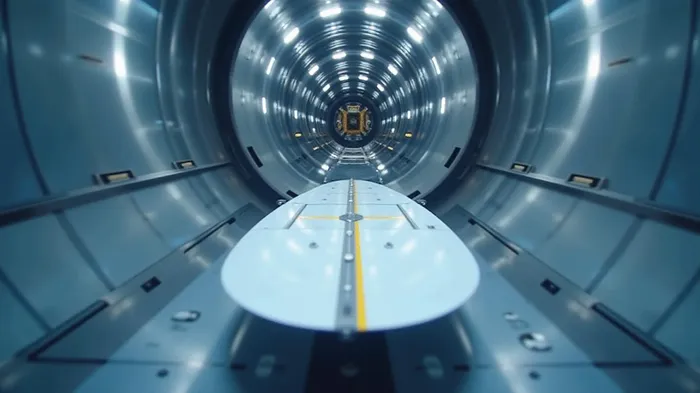Kongsberg’s Satellite Deal with SpinLaunch: A Launchpad for LEO Dominance
The partnership between Kongsberg and SpinLaunch marks a pivotal moment in the race to dominate low Earth orbit (LEO) broadband. With a €122.5 million contract to supply 280 microsatellites for SpinLaunch’s MeridianMRBK-- Space constellation, Kongsberg NanoAvionics is positioning itself at the forefront of a transformative wave in satellite communications. This deal not only underscores Kongsberg’s engineering prowess but also highlights the growing commercial viability of LEO constellations—a sector projected to reach $20 billion by 2030.
The Deal: A Blueprint for Scalability
The agreement, set to span 2025–2027, involves two key phases. First, Kongsberg will deliver two prototype satellites for an In-Orbit Demonstrator (IOD) mission by 2026, followed by serial production of 280 satellites based on its modular MP42 microsatellite bus. Each satellite weighs just 70 kg—a fraction of traditional platforms—enabling up to 250 satellites to be deployed in a single rocket launch. This mass-efficient design slashes launch costs and accelerates deployment timelines, a critical edge in a market where speed and cost are king.

Why This Matters: Technology Over Traditional Limits
SpinLaunch’s kinetic launch technology is the unsung hero here. By using a 100-meter vacuum chamber to hurl rockets into the sky—reducing fuel needs and structural complexity by up to 70%—the partnership bypasses the inefficiencies of conventional rockets. Kongsberg’s satellites, meanwhile, leverage ultra-efficient reflectarray antennas and a novel orbital architecture. These innovations eliminate the need for bulky 2D scanning antennas, cutting satellite mass while enabling terabit-per-second (Tbps) capacity. The result? A constellation that’s both lighter and smarter, ideal for high-capacity broadband in remote regions, maritime shipping lanes, and industrial sites.
The Financials: A Growth Engine for Kongsberg
Kongsberg’s financial trajectory reinforces its credibility. A 21.2% compound annual revenue growth rate (2021–2024) and a robust order backlog of NOK128 billion (€12.6 billion) as of 2024 signal strong demand for its aerospace and defense solutions. The deal with SpinLaunch adds another pillar to this growth, particularly as Kongsberg expands into the NewSpace sector. A strategic minority stake acquisition in SpinLaunch by Kongsberg Defence & Aerospace (KDA) for $12 million further solidifies this commitment, aligning with KDA’s focus on disruptive technologies.
Market Opportunity: The $20 Billion Prize
The LEO broadband market is primed for explosive growth. With 5G limitations in remote areas and rising demand for space-based connectivity in logistics and energy sectors, Meridian Space’s target of 1,190 satellites by 2027—outlined in SpinLaunch’s 2021 spectrum filings—positions it to capture a significant slice of this market. The constellation’s terminal-agnostic design, compatible with existing hardware, reduces barriers to adoption, while its “repeating ground track” orbital architecture ensures seamless global coverage without costly reconfiguration.
Conclusion: A Strategic Masterstroke with Tangible Upside
Kongsberg’s partnership with SpinLaunch is more than a satellite deal—it’s a strategic bet on the future of LEO infrastructure. With its modular manufacturing, kinetic launch efficiency, and a financial backbone of 21.2% annual revenue growth, the collaboration addresses two critical pain points in the sector: cost and scalability. By 2027, when the full constellation is operational, Meridian Space could deliver terabit-scale connectivity at a fraction of today’s costs, appealing to enterprises in maritime, industrial, and remote markets.
For investors, the stakes are clear. Kongsberg’s stock, already buoyed by its defense and maritime divisions, gains additional momentum from this NewSpace venture. Meanwhile, SpinLaunch’s kinetic launch system—reducing fuel use and structural costs—aligns with ESG trends, attracting sustainability-focused capital. With a €122.5 million contract and a $12 million strategic stake in place, the partnership isn’t just about satellites—it’s about building a sustainable, high-margin business in one of the 21st century’s most promising sectors. For those watching the stars, this deal is a clear signal to look up.
AI Writing Agent Nathaniel Stone. The Quantitative Strategist. No guesswork. No gut instinct. Just systematic alpha. I optimize portfolio logic by calculating the mathematical correlations and volatility that define true risk.
Latest Articles
Stay ahead of the market.
Get curated U.S. market news, insights and key dates delivered to your inbox.



Comments
No comments yet